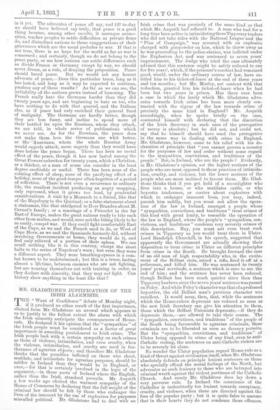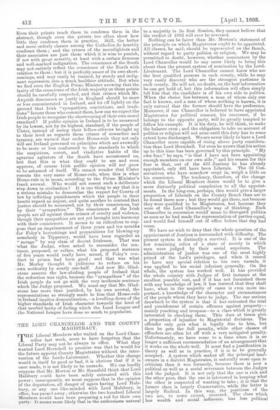MR. GLADSTONE'S JUSTIFICATION OF THE IRISH ALARMISTS. T ""Want of Confidence"
debate of Monday night, if it produced no other result of the first importance, elicited from Mr. Gladstone an avowal which appears. to us to justify to the fullest extent the alarm with which the Irish minority anticipate the consequences of Home- rule. He declared it his opinion that the " sympathies " of the Irish people must be considered as a factor of great importance in awarding punishment to Irish crime. The Irish people look with a certain sympathy on such crimes as those of violence, intimidation, and even cruelty, when the violence, intimidation, and cruelty are used in fur- therance of agrarian objects ; and therefore Mr. Gladstone thinks that the penalties inflicted on those who shoot, mutilate, and intimidate for agrarian purposes, should be milder in Ireland than they would be in England, or even,—for that is certainly involved in the logic of the argument,—in those parts of Ireland where the English, rather than the Irish, standard prevails. Mr. Asquith a few weeks ago elicited the warmest sympathy of the House of Commons by declaring that the full weight of the criminal law should be felt by those who endanger the lives of the innocent by the use of explosives for purposes miscalled political. Mr. Gladstone had to deal with an Irish crime that was precisely of the same kind as that which Mr. Asquith had referred to. A man who had for a long time been active in intimidatingthose Tipperary traders who did not take sides with the National League and the "Plan of Campaign," was arrested with an explosive charged with gunpowder on him, which he threw away as he was proceeding to the police-station, was indicted under the Explosives Act, and was sentenced to seven years' imprisonment. The Judge who tried the case ultimately advised that this sentence might be safely reduced to one for five years', which, if the prisoner's conduct had remained good, would, under the ordinary course of law, have en- titled him to his ticket-of-leave at the end of three years and ten months ; but Mr. Morley, not content with that reduction, granted him his ticket-of-leave when he had been but two years in prison. Has there ever been a case in which the lenity which Mr. Gladstone advo- cates towards Irish crime has been more clearly con- trasted with the rigour of the law towards crime of precisely the same kind in England? Mr. Asquith accordingly, when he spoke briefly on the case, contented himself with declaring that the discretion of the Irish Secretary in such uses of the prerogative of mercy is absolute ; but he did not, and could not, say that he himself should have used the prerogative in the same way in dealing with crime in England. Mr. Gladstone, however, came to his relief with his de- claration of principle that "you cannot govern a country for the purposes of law and order without some regard to the sympathies, convictions, and traditions of the people." But, in Ireland, who are the people ? Evidently, in Mr. Glad.stone's opinion, not the higher sections of the people who are most opposed to these practices of intimida- tion, cruelty, and violence, but the lower sections of the people who are most inclined to favour them. Mr. Glad- stone thinks that if you get hold of a moonlighter who fires into a house, or who mutilates cattle, or who boycotts tradesmen, or carries about explosives with which to endanger innocent lives, you may, indeed, punish him mildly, but you must not allow the opera- tion of the law in Ireland, amongst a people whose "sympathies, convictions, and traditions" treat crimes of this kind with great lenity, to resemble the operation of the law in England, where the people's "sympathies, con- victions, and traditions" condemn very severely crimes of this description. Nay, you must not even treat such crimes in Tipperary as you would treat them in Ulster. Lord Randolph Churchill, in his speech, suggested that apparently the Government are actually showing their disposition to treat crime in Ulster on different principles from crime in the South. He brought forward the case of an old man of high respectability who, in the excite- ment of the Belfast riots, seized a rifle, fired. it of at a policeman, and killed him. He was sentenced to twenty years' penal servitude, a sentence which is sure to see the end of him ; and the sentence has never been reduced, though Belfast has been much quieter since then than Tipperary has been since the seven years' sentence was passed on Foley. And while Foley' s character was that of &professed boycotter, the old Belfast man's previous character was excellent. It would seem, then, that, while the sentences which the Home-rulers deprecate are reduced so soon as the new Irish Secretary can give his attention to them, these which the Belfast Unionists deprecate,—if they do deprecate them,—are allowed to take their course. The "sympathies, convictions, and traditions" of the people of the South being favourable to agrarian criminals, these criminals are to be liberated as soon as decency permits. But the "sympathies, convictions, and traditions" Ulster being opposed to crime of any kind, even to anti- Catholic rioting, the sentences on anti-Catholic rioters are to be severely let alone. No wonder the Ulster population regard Home-rule as a kind of threat against civilisation itself, when Mr. Gladstone absolutely defends on principle lenient sentences on those who specially offend the moral feelings of the North, but advocates no such leniency to those who are betrayed into criminal wrath against the violent partisans of the Catholic Church. And surely Mr. Gladstone does lay down a very perverse rule. In Ireland the conscience of the Catholics is undoubtedly too lenient towards conspiracy, cruelty, and violence, when these are directed against the foes of the popular party ; but it is quite false to assume that in their hearts they do not condemn these offences. Even their priests teach them to condemn them in the abstract, though even the priests too often show how little they condemn them in practice. Still, the better and more orderly classes among the Catholics do heartily condemn them ; and the crimes of the moonlighters and their associates are just those which it is wise to punish, if not with great severity, at least with a certain firmness and well-marked indignation. The conscience of the South may not entirely reflect the conscience of the North with relation to them ; but it is perfectly aware of its own short- comings, and may easily be trained, by steady and indig- nant repression, into a much healthier attitude. But when we find even the En gliah Prime Minister avowing that the laxity of the conscience of the Irish majority on these points should be carefully respected, and that crimes which Mr. Asquith denounces so justly in England should be more or less commiserated in Ireland, and let off lightly on the ground that Irish "sympathies, convictions, and tradi- tions" favour those who commit them, how can we expect the Irish people to recognise the shortcoming of their own moral standard ? If public opinion in Ireland is to be measured by its lowest, not by its highest, standard, if the people of Ulster, instead of seeing their fellow-citizens brought up to their level as regards these crimes of cowardice and tyranny, are warned that under Home-rule they not only will see Ireland governed on principles which are avowedly to be more or less conformed to the standards to which the suspicious, covert, and vindictive habits of the agrarian agitators of the South have accustomed us, but that this is what they ought to see and even approve, of course Irish public opinion will not grow to be ashamed of itself. We cannot wonder that Ulster resents the very name of Home-rule, when this is what Home-rule is to mean, according to the Prime Minister's frank avowal. Who would not resent such a deliberate step down in civilisation ? It is one thing to say that it is a serious mistake to demoralise the respect for Courts of law by inflicting punishments which the people in their hearts regard as unjust, and quite another to contend that justice should be measured, not by their consciences, but by their "sympathies." The consciences of the Irish people are all against these crimes of cruelty and violence, though their sympathies are not yet brought into harmony with their consciences. It seems to us ridiculous to sup- pose that an imprisonment of three years and ten months .for Foley's boycottings and preparations for blowing-up somebody in Tipperary, would have been regarded as " savage " by any class of decent Irishmen. That was .what the Judge, when asked to reconsider the sen- ,tence, proposed, or rather, what his proposed sentence of five years would really have meant, if Foley's con- duct in prison had been good ; and that was what Mr. Morley thought it judicious to reduce on his -own authority by nearly one-half. And now Mr. Glad- stone assures the law-abiding people of Ireland that the reduction was right, because the " sympathies " of the Irish people do not go with the very moderate sentence which the Judge proposed. We must say that Mr. Glad- stone has more than justified, by his own avowal, the representations so strongly made to him that Home-rule in Ireland implies demoralisation,—a levelling-down of the higher standards of Irish character towards the level of that morbid laxity of feeling which the Land. League and the National League have done so much to popularise.



































 Previous page
Previous page